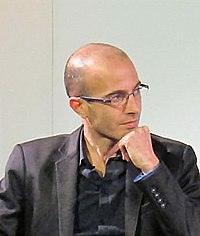尤瓦尔·赫拉利
外观
(重定向自尤瓦尔·赫拉利)
| Yuval Noah Harari 尤瓦尔·诺瓦·赫拉利 יובל נח הררי | |
|---|---|
 赫拉利(摄于2022年) | |
| 出生 | 1976年2月24日 |
| 居住地 | |
| 国籍 | |
| 母校 | 耶路撒冷希伯来大学 牛津大学耶稣学院 |
| 知名于 | 《人类简史》 |
| 配偶 | Itzik Yahav |
| 奖项 | Polonsky Prize for Creativity and Originality (2009 and 2012) Society for Military History's Moncado Award Young Israeli Academy of Sciences 中国国家图书馆年度最佳图书奖 |
| 网站 | www |
| 科学生涯 | |
| 研究领域 | 历史 |
| 机构 | 耶路撒冷希伯来大学 |
| 论文 | History and I: War and the Relations between History and Personal Identity in Renaissance Military Memoirs, c. 1450-1600(2002) |
| 博士导师 | 斯蒂文·冈恩 |
| 受影响自 | 贾雷德·戴蒙德 |
尤瓦尔·诺瓦·赫拉利(希伯来语:יובל נח הררי;英语:Yuval Noah Harari,1976年2月24日—),以色列历史学家。
早年生活
[编辑]赫拉利于1976年生于以色列海法。 他的家庭是一个世俗的犹太家庭。 他的父亲是一名国家雇佣的军备工程师,他的母亲是一名办公室管理员[1][2][3]。赫拉利三岁时自学读书。 他从 8 岁起就在海法的 Leo Baeck 教育中心的智力天才儿童班学习。 作为 Atuda 计划的一部分,他推迟了在以色列国防军的义务兵役以继续大学学习,但由于健康问题,他在学习后被免于完成兵役。 他17岁开始在耶路撒冷希伯来大学学习历史和国际关系。
学术生涯
[编辑]1993年至1998年,赫拉利在耶路撒冷希伯来大学攻读中世纪历史和军事史。 他完成了哲学博士学位。 2002 年在牛津大学耶稣学院获得学位,师从斯蒂文·冈恩。从2003年到 2005 年,他作为 Yad Hanadiv Fellow 从事历史学博士后研究[4]。 在牛津大学期间,赫拉利第一次接触到贾雷德·戴蒙德的著作,他承认戴蒙对他自己的写作产生了影响。 在博古睿研究所的一次沙龙中,赫拉利说戴蒙的《枪炮、病菌与钢铁》“对我来说是我学术生涯中的一种顿悟。 我意识到我真的可以写这样的书。”[5][6]
个人生活
[编辑]- 他有一位男性配偶(Itzik Yahav),他们于2002年相识,并在加拿大多伦多登记结婚。
- 截止2021年5月,他不使用智能手机。
著作
[编辑]

英文著作
[编辑]- Renaissance Military Memoirs: War, History and Identity, 1450–1600 (Woodbridge: Boydell & Brewer, 2004), ISBN 978-184-383-064-1
- Special Operations in the Age of Chivalry, 1100–1550 (Woodbridge: Boydell & Brewer, 2007), ISBN 978-184-383-292-8
- The Ultimate Experience: Battlefield Revelations and the Making of Modern War Culture, 1450–2000 (Houndmills: Palgrave-Macmillan, 2008),[7] ISBN 978-023-058-388-7
- Sapiens: A Brief History of Humankind (London: Harvill Secker, 2014) ISBN 978-006-231-609-7
- Homo Deus: A Brief History of Tomorrow (2016), ISBN 978-1910701881
- 21 Lessons for the 21st Century (2018)
- Nexus: A Brief History of Information Networks from the Stone Age to AI, (Fern Press, 2024), ISBN 978-1911717089
中文译本
[编辑]- 林俊宏/译:《人類大歷史:從野獸到扮演上帝》(台北:天下文化,2014);简体字版,《人类简史》,北京:中信出版社,2014)
- 林俊宏/译:《人類大命運:從智人到神人》(台北:天下文化,2017);简体字版,《未来简史》,北京:中信出版社,2017)
- 林俊宏/译:《21世紀的21堂課》(台北:天下文化,2018);简体字版,《今日简史》,北京:中信出版社,2018)
参考文献
[编辑]- ^ Par Salomon Malka (28 September 2017) Les prédictions de Yuval Noah Harrari (页面存档备份,存于互联网档案馆), L'arche magazine
- ^ Cadwalladr, Carole. Yuval Noah Harari: The age of the cyborg has begun – and the consequences cannot be known. The Guardian. 5 July 2015 [2 November 2016]. (原始内容存档于2017-09-03). 参数
|magazine=与模板{{cite web}}不匹配(建议改用{{cite magazine}}或|website=) (帮助) - ^ Parker, Ian. Yuval Noah Harari's History of Everyone, Ever. The New Yorker. 10 February 2020 [2022-12-31]. (原始内容存档于2020-02-10).
- ^ CV at The Hebrew University of Jerusalem. 2008 [2022-12-31]. (原始内容存档于2017-03-23).
- ^ Historian Yuval Harari on the Books That Shaped Him – Activities. Berggruen Institute. 28 February 2017 [24 July 2020]. (原始内容存档于2020-07-24) (美国英语).
- ^ Parker, Ian. Yuval Noah Harari's History of Everyone, Ever. The New Yorker. 6 February 2020 [24 July 2020]. (原始内容存档于2020-02-10) (美国英语).
- ^ Yuval Harari - SHORT OVERVIEW. [2016-09-02]. (原始内容存档于2018-11-03).
外部链接
[编辑]- 官方网站
- Meet the author – Yuval Harari video interview(页面存档备份,存于互联网档案馆) – BBC News
- 乌瓦尔·诺亚·赫拉利: 人类如何称霸地球?(页面存档备份,存于互联网档案馆)(TED, Jun 2015)
- TED上的尤瓦尔·赫拉利
